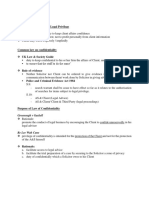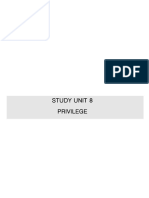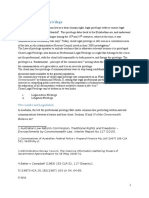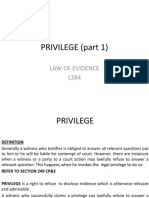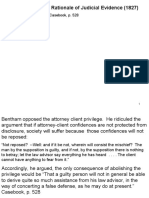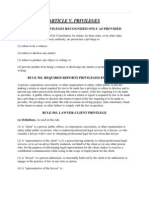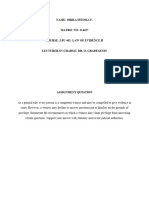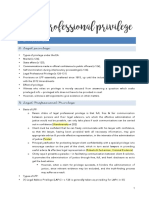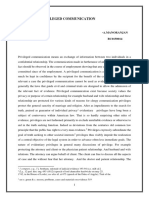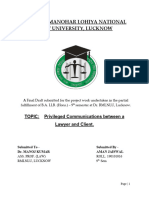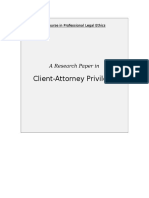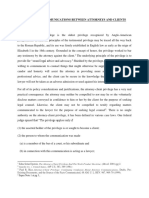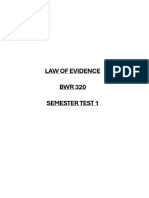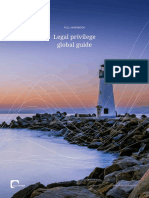PRIVILEGE
Def: a privilege is a rule of evidence that allows the holder of the privilege to
refuse to disclose information or provide evidence about a certain subject or
to bar such evidence from being disclosed or used in a judicial or other
proceeding.
There are many such privileges recognised by the judicial system, some
stemming from the common law and others from statute law.
Each privilege has its own rules, which often vary between jurisdictions.
The effect of the privilege is usually a right on the part of a party or witness to
a case, allowing them to refuse to produce evidence in the form of documents
or testimony from the person entitled to the privilege.
For example, a person can generally prevent their attorney testifying about
the legal relationship between attorney - client, even if the attorney were
willing to do so. In this case the privilege belongs to the client and not the
attorney.
In a few instances, such as the marital privilege, the privilege is a right held by
the potential witness. Thus, if a wife wishes to testify against her husband,
she may do so even if he opposes this testimony; however, the wife has the
privilege of refusing to testify even if the husband wishes her to do so.
On the other hand, the person entitled to a privilege is at liberty to waive the
privilege.
S290 – 297 of CPEA deals with privileges.
Types of Privileges
For the purposes of this study unit, 5 types of privileges are discussed, namely,
(i) Legal profession privilege (solicitor–client privilege/ attorney–client
privilege or legal professional privilege);
(ii) Privilege against self-incrimination;
(iii) Marital /Matrimonial privilege;
(iv) Without prejudice communications; and
(v) Privilege in Public interest.
See the provisions of sections 290 – 297 of the CPEA, which provide for the
privileges of parties in criminal and/or in civil proceedings.
(i) Legal Professional Privilege,
See the provisions of s294 of CPEA, s 8(2) – (6) of Civil Evidence Act.
1
� ▪ May also be referred to as solicitor–client privilege/ attorney–client
privilege or the legal professional privilege.
▪ This protects confidential communications between a client and his
or her legal adviser for the dominant purpose of legal advice.
▪ The rationale is that clients ought to be able to communicate freely
with their lawyers, in order to facilitate the proper functioning of the
legal system.
▪ This is contained in s8(2) of the Civil Evidence Act, which
provides that: No person shall disclose in evidence any
confidential communication between a client and his legal
practitioner or the legal practitioner's employee or agent; or a
client's employee or agent and the client's legal practitioner or the
legal practitioner's employee or agent; where the confidential
communication was made for the purpose of enabling the client
to obtain, or the legal practitioner to give the client, any legal
advice.
In Baker v Campbell (1983) 49 P.LR 385 at 442 Dawson J said:
▪ The law came to recognise that for its better functioning it was
necessary that there should be freedom of communication
between a lawyer and his client for the purpose of giving and
receiving legal advice and for the purpose of litigation and that this
entailed immunity from disclosure of such communications
between them.
s294 of CPEA provides that:
▪ No legal practitioner duly qualified to practise in any court,
whether within Zimbabwe or elsewhere, shall be competent to
give evidence against any person by whom he has been
professionally employed or consulted without the consent of that
person, as to any fact, matter or thing as to which such legal
practitioner, by reason of such employment or consultation and
without such consent, would not be competent to give evidence in
2
� any similar proceedings depending in the Supreme Court of
Judicature in England.
▪ Communication of information made by a client may not be
disclosed without the consent of the client.
▪ The communication is given in good faith and confidence.
▪ The privilege cannot be waived by the lawyer but by the client as it is
the client’s privilege and for his/her protection.
▪ The idea is to encourage full disclosure as a lawyer can only help on
the basis of full knowledge.
▪ Privilege may be waived by the client either expressly or impliedly; usually
express waiver would be when the client himself/herself discloses a
privileged communication, but waiver could also be inferred from other
conduct.
▪ In ex parte Minister of Justice in S v Wagner (1965) (4) SA 507 (A) at
514D the court held: that generally an implied waiver involves 'an element
of publication of the document or part of it which can serve as a ground
for the inference that the litigant or prosecutor no longer wishes to keep
the contents of the document secret'.
▪ However, where communication between client – attorney is for the
furtherance of illegal objectives are not subject to privilege.
▪ In R v Cox & RaiIton (1884) 14 QB 153 the two accused were charged with
conspiracy to defraud. The prosecutor called a lawyer to give evidence to
the effect that the accused persons had communicated their plans to
him. It was held that the information was not privileged because it was
disclosed for the furtherance of illegal objectives. At pages 165-166 the
court held that:
A man intending to commit treason or murder might safely take
legal advice for the purpose of enabling him to do so with impunity,
and ... the solicitor to whom application was made would not be at
liberty to give information against his client for the purpose of
frustrating his criminal purpose.
NB: – Discuss the manner in which the relevant provisions in the Civil
Evidence Act and CPEA enhance the protection of the legal profession
privilege?
3
� (II) Privilege against self-incrimination (or compelled self-
incrimination)
See the provisions of s290, s293, s297 - CPEA; s7 - Civil Evidence Act, and
also s70(1)(i) – Constitution.
▪ Self-incrimination: acts or declarations either as testimony at trial
or prior to trial by which one implicates himself in a crime. The
provisions in the Constitution and/ laws, prohibit the State from
requiring a person to be a witness against himself involuntarily or
to furnish evidence against himself.
▪ Self-incrimination is the act of exposing oneself generally, by
making a statement, "to an accusation or charge of crime; to
involve oneself or another [person] in a criminal prosecution or
the danger thereof".
▪ Self-incrimination can occur either directly or indirectly: directly,
by means of interrogation where information of a self-
incriminatory nature is disclosed; or indirectly, when information
of a self-incriminatory nature is disclosed voluntarily without
pressure from another person.
▪ This privilege against the constitutional right of a person to refuse
to answer questions or otherwise give testimony against himself
or herself which will subject him or her to an incrimination is now
applicable to the state through the due process and the
Declaration of Rights provisions (s70(1)(i)) of the Constitution,
and is applicable in any situation, civil or criminal where the state
attempts to compel incriminating testimony.
▪ Accused persons cannot be compelled to incriminate themselves
— they may choose to speak to police or other authorities, but
they cannot be punished for refusing to do so, including the right
to remain silent and the right to legal counsel.
Rights to Silence (s70(1)(i) of the Constitution of Zimbabwe)
▪ The right to silence is a legal principle which guarantees any individual the
right to refuse to answer questions from law enforcement officers or court
officials. It is a legal right recognized, explicitly or by convention, in many of
the world's legal systems.
▪ The right covers a number of issues centered on the right of the accused or
the defendant to refuse to comment or provide an answer when questioned,
either prior to or during legal proceedings in a court of law. This can be the
right to avoid self-incrimination or the right to remain silent when questioned.
The right may include the provision that adverse inferences cannot be made
by the judge or jury regarding the refusal by accused/ defendant to answer
questions before or during a trial, hearing or any other legal proceeding. This
right constitutes only a small part of the defendant's rights as a whole.
4
� ▪ The origin of the right to silence is attributed to Sir Edward Coke's challenge
to the ecclesiastical courts and their ex officio oath. In the late 17th century, it
became established in the law of England as a reaction of the people to the
excesses of the royal inquisitions in these courts.
(iii) Without Prejudice Privilege (s8(2) – (6) & s9(2) – Civil Evidence Act).
▪ These are out-of-court negotiations between parties to a civil dispute
in which one or both parties have made admissions, offers or
concessions of compromise.
▪ Such offers cannot be brought to the attention of the court without the
consent of the other party.
▪ The privilege is intended to protect communications made in the
course of bona fide negotiations with a view to settle a legal dispute.
▪ This is to encourage out of court settlement.
▪ However, the contents of the communication may dictate whether the
communication was intended to be without prejudice or not.
(ii) Privilege in Public-interest
See the provisions of s10 of Civil Evidence Act; and s295 of CPEA, see
also section 296 of CPEA
▪ formerly Crown privilege, was intended to protecting documents for which
secrecy is necessary for the proper functioning of government.
▪ Public-interest, is a principle originally from English common law under which
the English courts can grant a court order allowing one litigant to refrain
from disclosing evidence to the other litigants where disclosure would be
damaging to the public interest.
▪ This is an exception to the rule that all parties in litigation must disclose any
evidence that is relevant to the proceedings.
▪ In making a public interest order, the court has to balance the public interest
in the administration of justice (which demands that relevant material is
available to the parties to litigation) and the public interest in maintaining the
confidentiality of certain documents whose disclosure would be damaging.
▪ Public interest orders have been used in criminal law against large organized
criminal outfits and drug dealers where the identity of paid police informants
could be at risk.
❖ State Privilege
See section 296 of the CPEA. This privilege may also be related to privilege in
public interest discussed above.
5
� ▪ State privilege relates to affairs of the state, for example, cabinet
meetings and issues relating to defence and state security.
▪ See S v Tsvangirai NH-244-02.
(iii) Matrimonial/ spousal/ marital privilege
See the provisions of s9 of Civil Evidence Act; s291 & s292 of CPEA
At common law, spousal privilege (marital privilege or husband-wife privilege)
is a term used in the law of evidence to describe two separate privileges that
apply to spouses: the spousal communications privilege and the spousal
testimonial privilege.
▪ Both types of privilege are based on the policy of encouraging spousal
harmony and preventing spouses from having to condemn, or be condemned
by, their spouses.
▪ the spousal communications privilege or confidences privilege is a form
of privileged communication that protects the contents of confidential
communications between spouses during their marriage from testimonial
disclosure, while spousal testimonial privilege (also called spousal
incompetency and spousal immunity) protects the individual holding the
privilege from being called to testify in proceedings relating to his/her spouse.
However, the spousal privileges have their roots in the legal fiction that a
husband and wife were one person.
▪ Marital or a spousal communications privilege applies in civil and in criminal
cases.
▪ Both the witness-spouse and the accused-spouse have the spousal
communications privilege, so either may invoke it to prevent the witness-
spouse from testifying about a confidential communication made during the
marriage.
▪ The communications privilege begins on marriage. (s301 of CPEA -proof of
marriage).
▪ The privilege covers communications made during the marriage, and cannot
be invoked to protect confidential communications between currently married
spouses which occurred prior to their marriage.
▪ Unlike testimonial privilege, the communications privilege survives the end of
a marriage, and may be asserted by a spouse to protect confidential
communications that were made during the marriage—even after divorce or
death.
▪ The spousal communications privilege may not be invoked if (i) the spouses
are suing each other or each other's estates in a civil case; (ii) nor if one of the
spouses has initiated a criminal proceeding against the other; (iii) nor in a
competency proceeding regarding one of the spouses.
▪ These three scenarios are identical to the limitations which also apply to limit
the spousal testimonial privilege.
6
� ▪ Two further scenarios may defeat the spousal communications privilege: (iv) if
the confidential communication was made in order to plan or commit a crime
or fraud, or (v) if a defendant-spouse wishes, in a criminal trial, to testify in
their own defence, about a confidential marital communication.
▪ In these five situations, a court will not allow either spouse to assert the
privilege to block the testimony.
➢ What are the exceptions to this privilege?
Classifications of the Privilege
(i) Parties must be married in a recognized marriage. (s301 of CPEA may
apply)
▪ In Zimbabwe, recognized marriage can be customary or civil marriage.
This privilege survives beyond divorce, that is, an ex-spouse cannot testify
about matters that happened during the subsistence of the marriage.
In R v John 1966 (2) SA 66 - the court recognized privilege to extend to an
unregistered customary law union.
The rationale is to encourage spouses to be free with each other and enjoy
their marital situation.
(ii) Privilege is only specific to the spouses in question.
A communication between the spouses may be proved by a witness who
overheard or intercepted it.
In Romping v OPP (1964) AC 814 - accused was a Dutch sailor charged with
the murder of a woman at an English port. The principal evidence against him
was a letter he wrote to his wife, containing what amounted to a confession.
He gave the letter to a shipmate to post but the man handed it over to the
police instead.
House of Lords held: that there was no rule that prevented the letter from
being received in evidence.
In Zimbabwe, however, marital privilege does not extend to certain cases.
Why?
▪ Among these cases include where a spouse is charged with bigamy, rape,
incest or perjury committed in connection with or for the purpose of any
judicial proceedings instituted or to be Instituted or contemplated by the
one of them against the other, or in connection with or for the purpose of
any criminal proceedings in respect of any offence in s247(2) of CPEA.
▪ In such cases, spouse of accused person shall be competent and
compellable to give evidence for the prosecution without the consent of
the accused person where such a person is prosecuted for any offence
against the person of either of them or any of the children of the marriage.
Matters That Are Not Privilege
7
�o What one discloses to their doctor is not privileged.
o There is no privilege between priest and parishioner.
o There is a difference between privilege and confidentiality.




